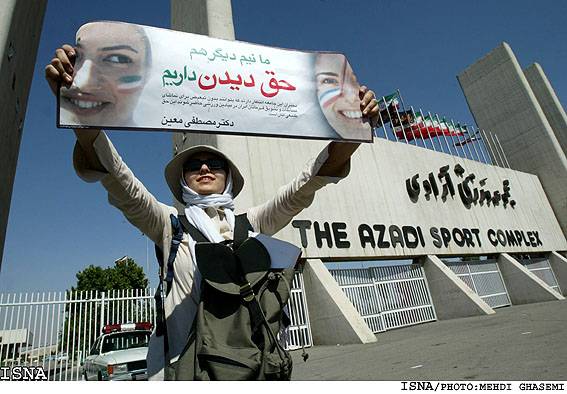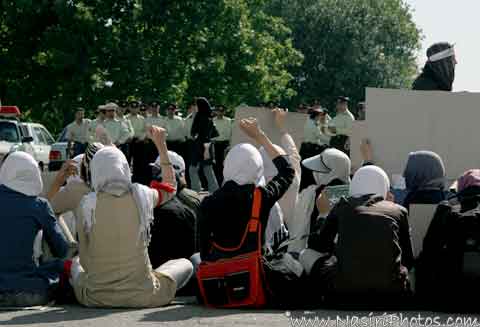Open stadiums is a nation-wide campaign which has gained international attention through its very public and legitimate defy of the ban. Semanur Karaman interviewed the faces behind the campaign to understand their aspirations for Iran and expectations from the global feminist movement.
Football is a multi billion-dollar industry which is highly politicized across the globe. Take into account the recent FIFA presidential vote, which has sparked up a global debate on how sports can be the instrument to access more power for those responsible for grave human rights abuses. Activists from around the globe, and of those from the Bahraini diaspora, joined in a global call to protest Sheikh Salman bin Ebrahim al-Khalifa’s nomination to presidency at FIFA, and asked for greater accountability and transparency from the organization.
Football in Iran is a matter of politics too, where since 1982 women are prohibited from attending public sporting events. For example in October 2014, Ghoncheh Ghavami, a 25 woman, was arrested when she tried to attend a volleyball game in Tehran. Iranian women, however, were quick to tackle this issue as a part of the pioneering human rights struggle and feminist agenda of Iran. They have been operating undercover to defend the very basic yet fundamental right of women to exist in the public space without hindrance or restrictions.

A woman protests outside The Azadi Stadium in Tehran, Iran
Open stadiums is a nation-wide campaign which has gained international attention through its very public and legitimate defy of the ban. Semanur Karaman interviewed the faces behind the campaign to understand their aspirations for Iran and expectations from the global feminist movement.
The identity has been kept anonymous for security reasons.
Can you please tell us a bit about your work?
It’s been 10 years since we started our activism supporting women’s participation to public sports events in Iran. When we were teenagers, we were really into sports, especially soccer, basketball and volleyball.
Growing up as young women, we could go to basketball and volleyball events but not to football matches and that made us so angry. The kind of discrimination which takes away a woman’s freedom to exist in the public space just as any man is the essence of our activism in Iran.
We wanted to turn this anger into good use. Therefore, we joined a feminist group and we started to demonstrate in front of the Azadi stadium in Tehran. When we started our activities some people laughed at us, some of which feminist groups, saying “We have so many more problems and you want to go to stadiums to watch some men chasing a ball?” However, going to public sporting events was very important to us because it symbolized our pursuit of reclaiming public spaces for women.
Following two demonstrations some clerics warned that watching men play soccer when some of their body parts are not covered is haram for women in the Spring of 2006. Our 3rd march to the Azadi Stadium meant that we disobeyed their order. Special forces and the female police surrounded us. Having received such a harsh reaction from the government, we understood they were serious about the whole ordeal.
However, we did not give up. We started an online campaign, contacted journalists, and film makers. We also contacted the FIFA and AFC. And you know what? Our campaign became a success! After 2 years of committed advocacy, FIFA and AFC declared they will not include Iran in international football events due to the ban on women’s participation.
During the elections of 2009 where Ahmedi Nejad won for a second term despite alleged election rigging and escalating public protests over his repressive rule, the government arbitrarily arrested many activists. Many members of our passionate, committed group of feminists had to leave the country.
When Rouhani was elected in September 2013 and the Fifa President visited Iran I felt a strong need to resurface our campaign and restart our conversation with the FIFA. Therefore I started @openstadiums in English. A couple of months after our campaign resurfaced the government banned the attendance of women to public volleyball events.
What are challenges you face while supporting the attendance of women to public supporting events?
When women collectively march to public sporting events special forces severely confront us, also extremists and Ayatoallahs. In June 2015 our opponents said if women participate to public sporting events there will be a bloodbath.

A gathering of women outside The Azadi Stadium in Tehran, Iran
It is also quite brutally demoralizing when ordinary citizens or intellectuals in Iran were mocking our campaign. People had a hard time taking our demand to attend to public sporting events seriously. However, this is our right. More importantly this is a strict ban on our right to enjoy and participate to public spaces. This is an issue that is very dear to our hearts and we deserve to be taken seriously. One of our great achievements were to turn this issue which was not cared at all by anyone to one deeply discussed from intellectuals to ordinary citizens.
Although there were attempts to undermine our legitimate and strong demands, during the FIVB World Leauge in 2015 the ban on women’s presence in stadiums was a leading topic in Persian social media and news websites.
What are your hopes and aspirations for young women of Iran?
Women in Iran live in a patriarchal society. We are governed by sexist laws and social norms imposed to regulate affairs that should be regulated by our own choices. There is a strong women’s rights movement in Iran composed of women tirelessly working to change or get rid of sexist laws, regulation and social norms. And this change is happening.
We have a long road ahead of us. A lot of fellow feminists, who are our inspiration, had to leave the country. However, women of Iran are very vocal on social issues. They are strong. They know what they want. Good days are ahead of us.
What motivates you? What are some strategies you adopt for your safety and wellbeing?
We want to live in a better world and be a part of the efforts to construct a better world. That process is impossible without women. The will to construct and be part o a better world is our aspiration and motivation.
We all live in constant fear of getting arrested, and this is very difficult. We now know and realize that fear comes from not knowing. So our strategy for safety and wellbeing is studying the situation carefully to be aware of risks and always being cautious. Not slipping even for a second. Moderating risks and being cautious is essential to keeping up courage.
What are your thoughts on feminism and the larger global feminist movement?
We strongly believe we should connect a lot more. We need unity among us feminists to topple down unequal power structures. We are very optimistic about our collective future.

Iranian women protesting for their right to claim public space
Our best moments is when we are with feminist friends across the globe, but mostly from the MENA region. Despite the bad blood between our governments, they are so close to my heart. We are all so similar because of all the political and religious extremists in our countries. We take strength knowing we are never alone, and that we are a part of a support system of feminists in the region and across the globe.
How can the international community support your meaningful work?
Please spread the word about our concerns and demands. If you have read this interview tell your friends and families about our campaign and our call to have a life of equality and dignity. Invest time in getting to know struggles that are not your own, familiarize yourself with them, tell your loved ones about how people in other parts of the world live and what their aspirations are.
If you are an international organization hire more women from Iran. Don’t shy away because Iran is not a democracy. Find ways to make us part of your ecosystem. Not only help our advocacy efforts, but concretely contribute to our economic independency as Iran is full of obstacles for women who want to stand on their own two feet. Don’t just try to help us with support, but be that very support itself politically, socially, economically.
As told to Semanur Karaman, a feminist activist from Turkey, who serves as one of FRIDA’s thematic advisors.
All pictures provided by Open Stadiums